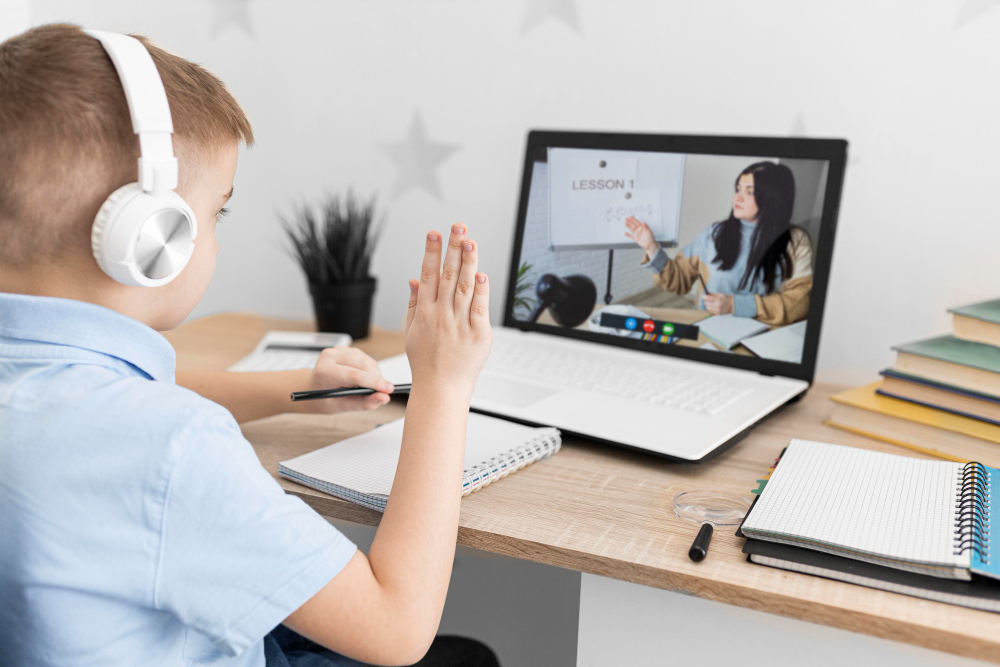Create the Perfect Home Study Space for your Kids

As a parent, you want to enable your child to maximize their performance at home and in the classroom. By creating a study space that’s right for your child, you’ll be able to create the right conditions for helping them succeed. But before we explore what makes up a perfect study area, let’s briefly touch on why this area is so important.
Importance of a Dedicated Study Space
Creating a study space for your kids is important. It’s the first step in teaching them how to learn, manage their time, and get things done. In order for your kids to have the best possible study habits, they need a quiet, distraction-free space.
Building the right study space for your kids is key to helping them be successful and happy in school. When choosing a place for your children to study, consider the following factors:
Create a space that will allow them to focus.
The best way to create a space that will allow your child to focus is by creating an environment that is both comfortable and distraction-free. To do this, you’ll need to find a quiet place where they won’t be disturbed by other people or noise. The room should also be well lit, so they can easily see their work.
Make sure there’s plenty of space around them—enough room for them to reach everything they need (but not too much). An organized area is key; make sure all their school supplies are within arm’s reach, so they don’t have to scramble around every time they need something. Finally, try not to put the study area in front of the TV! Your children will have trouble concentrating if they’re constantly bombarded with distractions like shows, movies, and games coming from the TV or computer screen next door!
It’s also important that the temperature isn’t too hot or cold for your child: when it gets too hot out there will be no studying going on at all because everyone likes ice cream instead!
Remove all distractions and use natural light.
Now that you have a space, it’s time to create the ideal environment. This means making sure your kids are free from distractions. Avoid turning on any electronic devices or appliances, including TVs and radios—even if they’re set to silent mode or off completely. Minimize background noise and turn on airplane mode to avoid online distractions. Turn down the lights in your study area so that it’s dark enough for them to concentrate on their work but light enough for them to see what they’re doing; this will help them focus on reading rather than falling asleep and waking up hours later when their eyes adjust. You may use a bright desk lamp or a wall lamp.
For a more productive study space, turn off the doorbell and lock your doors so visitors don’t interrupt you during study time with their visits, if possible.

Have the right supplies on hand.
A good quality desk and chair are essential, as they will provide a comfortable place to study while keeping your child focused and calm. Choose a desk with plenty of space for writing, as well as storage for books and papers. If you have multiple children in the house, consider investing in desks that pull out from walls so they can share one piece of furniture rather than each needing their own separate workstation. For more storage space, invest in a desk organizer.
Another option is buying two small desks that fit together into one long unit when unfolded (this way they can each have their own workspace but still share things like pens, pencils, paperclips, study materials, etc.).
You should also ensure your child has access to lighting appropriate for reading or doing homework—after all, nobody wants to be stuck sitting under an overhead light! A floor lamp next to their seat can be helpful if needed; otherwise, a table lamp or a small desk lamp should suffice until it gets dark outside (which means less time spent waiting for your kid’s eyesight after work).
As far as chairs go: get something sturdy enough that not only last through years of use but also won’t tip over when some excited kid jumps up too quickly after finishing an assignment! We also recommend getting some sort of footstool in your dedicated space which allows kids who need extra height while sitting down during class time/studying at home during homework hours.
Make the study room comfortable and supportive.
The chair needs to be comfortable. The desk needs to be sturdy and of the right height, so that your child can work comfortably without straining their back or neck during a study session. Again, make sure there is enough space for all their supplies. You may want to invest in an ergonomic adjustable stool or chair if your child has trouble sitting still for a long time period of time at one sitting when sitting or using a desktop computer.
Lastly, make sure the chair is stable and won’t tip over, as this could be dangerous! Ergonomic support is necessary for a better experience.
Let them customize their space with their own style.
Another way to let your child feel like they have control over the space is to let them customize it with their own style. When kids get a say in how the space looks and feels, they’re more likely to want to spend time there. This can be as simple as choosing a few paint samples for the walls or letting them pick out some new furniture that works with what you already have. If you want to get really fancy, try having an open house where everyone comes by and has fun decorating their room together!
It’s important for children of any age who are trying to focus on their schoolwork or hobbies (like reading) that they feel comfortable in their environment—this means both physical comfort and emotional comfort. Having things like lights off when it gets dark outside helps keep those distractions and eye strain at bay so they can focus better throughout the day; but if all else fails and nothing else seems right, just remember this one rule: anything goes when we are talking about creating great spaces for kids!

Kids who have a great study space will do better at school work and other chores.
Nothing is more important than a room that’s set up for success. The best study spaces have the right combination of comfortable furniture, a clean and organized environment, and plenty of inspiring decors to keep your child focused on their school work. A study space should be inviting and fun for kids to spend time in without distractions from electronics or other activities. Your child should be able to do their homework without feeling too tired or hungry too often. If you want them to study in their room instead of watching TV or playing video games all night, set up an area where they can do so effectively by following these tips:
- Choose comfortable furniture – it’s not just about looks!
- Keep it clutter-free! Have one place where your child puts things away after using them (like reading glasses) instead of leaving them out everywhere on desks and tables. This will help keep things looking neat as well as organized so kids don’t lose track of anything they need while studying or doing chores around the house.* Encourage outdoor time at least once every day (this includes pets too!). Fresh air clears out both minds AND bodies as nothing else can.* Make sure there is enough light coming into each room; this way everyone can see clearly which makes learning easier overall!
Creating the perfect study space for your children should be a fun and rewarding experience. Whether you have young kids or teenagers, they will all benefit from having their own space to learn, grow and focus on their schoolwork. Great study space can be as simple as setting up a small desk with some coloring books in their bedroom or building an elaborate loft bed with plenty of storage underneath for all of their books and supplies. Regardless of what you decide to do, remember that it will be worth it when your kids are doing better at school work because they have a comfortable place to sit down and concentrate on their lessons instead of being distracted by everything around them!




